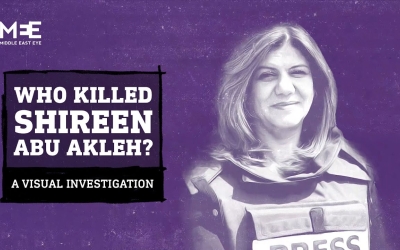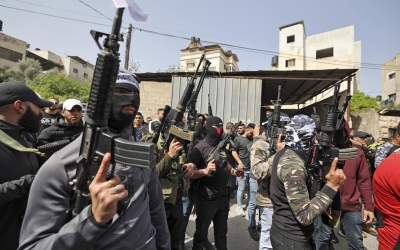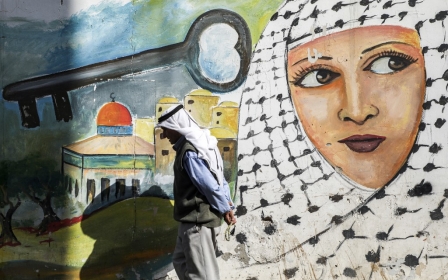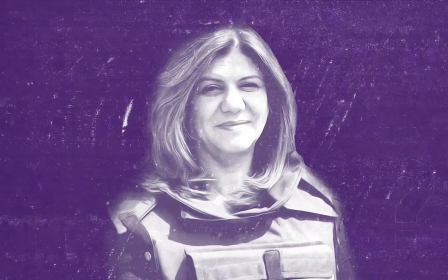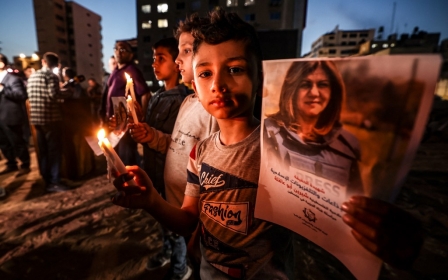West Bank: Israeli troops fire missile at Palestinian home in Jenin, arrest fighters

Israeli forces surrounded a Palestinian house on Friday in Jenin's refugee camp, in the north of the occupied West Bank, and targeted it with a short-range missile in an attempt to arrest two Palestinian fighters inside.
The fighters fired back, leading to a four-hour standoff, which ended with Israeli troops capturing the two young brothers, identified as Mahmoud and Anas al-Dabai.
At least 13 Palestinians and one Israeli officer were wounded during the raid on the camp, as Palestinian fighters responded to the incursion with live fire, and gun battles with Israeli troops followed in multiple locations.
'They have fired directly at the house we are taking cover in'
- Samer Khwaira, journalist trapped in Jenin
The army raid comes two days after Israeli troops shot and killed veteran journalist Shireen Abu Akleh in a similar operation in Jenin.
The Israeli army said earlier that forces from the military, elite police units and the Shin Bet, Israel's internal intelligence agency, were operating in Jenin.
New MEE newsletter: Jerusalem Dispatch
Sign up to get the latest insights and analysis on Israel-Palestine, alongside Turkey Unpacked and other MEE newsletters
A member of the Yamam elite unit who was shot in Jenin's Burqin town has succumbed to his wounds after he was transferred to hospital in a serious condition, border police said.
The Palestinian Ministry of Health said at least five people are in a critical condition and that teenagers were among those being treated in Ibn Sina hospital.
One of the casualties was identified as Dauod Zubaidai, 40, brother of a former senior Fatah military leader in Jenin, Zakaria Zubeidi, who is in Israeli custody.
Sources told Middle East Eye the Dabai brothers, who were under Israeli siege and later apprehended, have been wanted by the army for several months.
They are accused of being members of the Palestinian Islamic Jihad’s armed wing, al-Quds Brigades (Saraya al-Quds).
Footage shared by residents, and confirmed by sources, showed Israeli troops firing the short-range Energa anti-tank rifle grenade at their house, setting it ablaze when the missile struck the upper section of the building.
A dog initially thought to be wearing a military vest and sent into the house by Israeli troops, was seen to be on fire.
It was later confirmed that it was a pet dog that belonged to the family. It died in the fire.
Journalists under fire
Journalists taking cover in a nearby building, around 50 metres away, also came under fire and were besieged for a while during the Israeli operation.
“They have fired directly at the house we are taking cover in,” said Samer Khwaira, one of the reporters trapped in the area.
“We can’t even look over from the windows. The army is everywhere and they have just sent in more reinforcements. There are snipers and soldiers in every street,” Khwaira added in a recorded voice note heard by MEE, while gunshots could be heard in the background.
Palestinian ambulances trying to reach the wounded were obstructed by Israeli forces, one medic said.
“Our crews were stopped by Israeli forces and couldn’t move as the Israeli army claims it’s for our safety,” said Hazem Masarwa, a medic with Jenin’s Ibn Sina hospital.
Jenin refugee camp is a stronghold of Palestinian resistance. There are at least 50 fighters in the camp wanted by Israel and the total number of fighters is probably much higher.
For months, the Israeli army has been ramping up intelligence and military operations there to root out the fighters.
In January, MEE visited the camp and spoke with residents and some of the fighters, who said they carry guns to defend themselves against Israeli raids and attempts to arrest them.
The most recent Israeli incursion in Jenin occurred two days ago. Israeli forces killed Al Jazeera journalist Abu Akleh and wounded another journalist, Ali al-Sammoudi, after a group of reporters, who made themselves visible to soldiers, came under fire.
Middle East Eye delivers independent and unrivalled coverage and analysis of the Middle East, North Africa and beyond. To learn more about republishing this content and the associated fees, please fill out this form. More about MEE can be found here.


